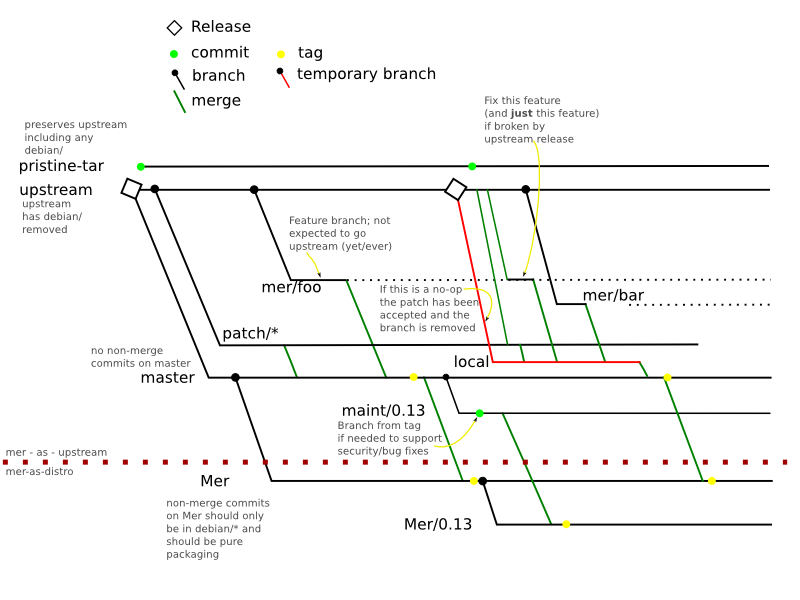Mer/Build/UsingGitorious
Contents |
Packaging
The Mer DVCS packaging process looks like this:
An upstream package is unpacked and the debian/ directory is removed.
It is then commited onto the upstream branch.
pristine-tar is used to ensure that the upstream tarball can be recreated perfectly.
master is the main branch and the only non-merge commits directly on this branch should be packaging-based and in debian/
All features or bug fixes are broken out to additional branches; 1 branch per feature or fix. The main difference is that features are not likely to go upstream whilst fixes are. This is very similar to quilt.
Developing
Development of a feature is done by cloning master; then branching locally and developing against master.
Once development is complete a new feature branch is created and the development branch is then cherry-picked onto the new feature branch.
Moving a Package to Gitorious
Initial setup
The following scripts need:
PKG=<package name> GPKG=<gitorious-safe package name> (ie [a-z0-9_-] UPVER=<upstream version> TARBALL=<tarball name> TAG=<new version>
Get the upstream source unpacked
mkdir $PKG cd $PKG mkdir _tmp cd _tmp tar xf ../../$TARBALL mv */* ../ cd .. rm -rf _tmp
Cleanse the install
mv debian ..
Create a git repo with the new stuff
git init
git add .
git commit -am"${PKG}_$UPVER"
This is really the upstream branch
git branch -m master upstream
For keeping an eye on things you may want gitk running. Use File->reload frequently (F5 doesn't work for me)
gitk --all &
Save state
pristine-tar commit ../$TARBALL
Prepare structure create master branch from upstream
git checkout -b master
create Mer branch from master
git checkout -b Mer
Apply debianisation
mv ../debian . git add debian/ git commit -am "initial debianize from upstream"
Feature/patch branches
Now apply features from the .diff.gz this has to be done manually
Identify a libtool feature
git checkout upstream git checkout -b mer/libtool
apply hunks
git commit -am"libtool fixes"
Identify an obs-fix feature
git checkout upstream git checkout -b mer/obs-fix
apply hunks
git commit -am"obs pthread fixes"
Now any debian/ hunks
git checkout Mer
apply hunks
git commit -am"Added Mer debianisation"
Now pull it all together
git checkout master
look for all the mer/* and patch/* branches and merge them
git branch -l git merge mer/libtool git merge mer/obs-fix
now use git log to create a top level ChangeLog entry
git add ChangeLog git commit -m"$TAG"
Mark an 'upstream' release
git tag $TAG
Now make a distro release
git checkout Mer git merge master
now use git log to create a debian/changelog entry
git add debian/changelog git commit -m"Mer_$TAG" git tag Mer_$TAG
Verify
Remove all obs code:
cd .. rm $PKG*
regenerate it:
cd $PKG pristine-tar checkout ../$TARBALL debuild -S -i.git
Build or examine to verify
Push
Now push to gitorious
git symbolic-ref HEAD refs/heads/Mer
Logon to http://gitorious.org/mer and create gitorious project
git remote add origin git@gitorious.org:mer/$GPKG.git git push --mirror origin
on gitorious goto 'Edit Repository' and set default to Mer
Handling new upstream
This shows by example how glib upstream was merged.
Clone the gitorious repository (I made a clone on gitorious first) at git@gitorious.org:~lbt/mer/glib2_0-mer.git
http://gitorious.org/~lbt/mer/glib2_0-mer
Get new upstream
wget https://launchpad.net/ubuntu/jaunty/+source/glib2.0/2.20.1-0ubuntu2/+files/glib2.0_2.20.1.orig.tar.gz TARBALL=glib2.0_2.20.1.orig.tar.gz mkdir ../patches cd ../patches/ wget https://stage.maemo.org/svn/maemo/projects/haf/branches/glib/glib-2-20/debian/patches/25-gatomic.patch wget https://stage.maemo.org/svn/maemo/projects/haf/branches/glib/glib-2-20/debian/patches/30-gfileutils.patch wget https://stage.maemo.org/svn/maemo/projects/haf/branches/glib/glib-2-20/debian/patches/35-gmessages.patch wget https://stage.maemo.org/svn/maemo/projects/haf/branches/glib/glib-2-20/debian/patches/40-gscanner.patch wget https://stage.maemo.org/svn/maemo/projects/haf/branches/glib/glib-2-20/debian/patches/45-gunicode.patch wget https://stage.maemo.org/svn/maemo/projects/haf/branches/glib/glib-2-20/debian/patches/50-gthread.patch wget https://stage.maemo.org/svn/maemo/projects/haf/branches/glib/glib-2-20/debian/patches/60_wait-longer-for-threads-to-die.patch wget https://stage.maemo.org/svn/maemo/projects/haf/branches/glib/glib-2-20/debian/patches/70_use-monotonic-clock-for-timeouts.patch wget https://stage.maemo.org/svn/maemo/projects/haf/branches/glib/glib-2-20/debian/patches/series
Prepare to merge
git clone git@gitorious.org:~lbt/mer/glib2_0-mer.git cd glib2_0-mer/ git checkout --track origin/upstream git rm -r *
replace the upstream code
mkdir _tmp cd _tmp tar xf ../../$TARBALL mv */* ../ cd .. rm -rf _tmp git add .
Now we have a clean upstream release
git commit -am"glib2.0_2.20.1" git tag 2.20.1 pristine-tar commit ../glib2.0_2.20.1.orig.tar.gz
Apply all the maemo patches to their own branches
git checkout upstream;git checkout -b mer/25-gatomic patch -p1 < ../patches/25-gatomic.patch git commit -am"applied gatomic"
git checkout upstream;git checkout -b mer/30-gfileutils patch -p1 < ../patches/30-gfileutils.patch git commit -am"applied gfileutils"
git checkout upstream;git checkout -b mer/35-gmessages patch -p1 < ../patches/35-gmessages.patch git commit -am"applied gmessages"
git checkout upstream ;git checkout -b mer/40-gscanner patch -p1 < ../patches/40-gscanner.patch git commit -am"applied gscanner"
git checkout upstream ;git checkout -b mer/45-gunicode patch -p1 < ../patches/45-gunicode.patch git commit -am"applied gunicode"
git checkout upstream ;git checkout -b mer/50-gthread patch -p1 < ../patches/50-gthread.patch git commit -am"applied gthread"
git checkout upstream ;git checkout -b mer/60-wait-longer-for-threads-to-die patch -p1 < ../patches/60_wait-longer-for-threads-to-die.patch git commit -am"applied wait-longer-for-threads-to-die" git checkout upstream ;git checkout -b mer/70_use-monotonic-clock-for-timeouts patch -p1 < ../patches/70_use-monotonic-clock-for-timeouts.patch git commit -am"applied use-monotonic-clock-for-timeouts"
Now to create a Mer glib from a master
git checkout --track origin/master
Upgrade entire glib
git merge upstream
Now we apply in series order.. feel free to do this in different orders
git merge mer/60-wait-longer-for-threads-to-die git merge mer/25-gatomic git merge mer/30-gfileutils git merge mer/35-gmessages git merge mer/40-gscanner git merge mer/45-gunicode git merge mer/50-gthread git merge mer/70_use-monotonic-clock-for-timeouts
Previous Mer patches...
git merge origin/mer/libtool git merge origin/mer/obs-fix
(up to date!)
Now we have a new release
editor ChangeLog git add ChangeLog git commit -m"2.20.1-mer1" git tag 2.20.1-mer1
And a new Mer release
git checkout --track origin/Mer git merge master editor debian/changelog git add debian/changelog git commit -m"Mer_2.20.1-mer1" git tag Mer_2.20.1-mer1
Now push
git push --all git push --tags
Working from Gitorious
This should be written to say "Clone this repository on gitorious" and then publish back there and then submit a pull request to Mer.
For core work:
Essentially
git clone git@gitorious.org:mer/$GPKG.git git checkout --track origin/Mer
determine which feature or branch needs work. Then:
git checkout --track origin/mer/<feature>
hack...
Ready to test? You need to make a local test branch based on Mer
git checkout Mer git checkout -b local git merge mer/<feature>
Build and test...
If this works OK then clean up your mer/<feature> branch... probably doing a --squash and push the branch to gitorious.

